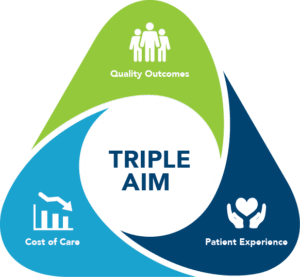Imagine a scenario where you’ve just left the hospital after a procedure. You’re confused about the discharge instructions and not sure you’ve understood everything.
You weren’t able to see your usual primary care provider because there weren’t any appointments available soon enough. And you haven’t filled the necessary prescriptions to help you recover because you were worried the cost was outside of your budget.
As a result, your recovery didn’t go well, and you ended up back at the hospital, facing complications and another long hospital stay.
Unfortunately, readmission is something that happens far too often when patients aren’t given continual care and support after a procedure. This is an aspect of basic healthcare that’s been lacking in the U.S. for many years.
Health facilities have fallen into a pattern of operating based on volume: seeing patients only when they feel their worst, treating them and quickly sending them on their way. While most healthcare organizations never intended to work like this, the “treat them and street them” model has contributed to serious population-wide health problems where patients are only cared for when care becomes most expensive.
What Are We Doing to Change That?
We’re shifting away from healthcare dictated by the volume of patients we see and focusing instead on the long-term quality we can provide them even after they’ve left their doctor’s appointment. It’s known as value-based care and it’s at the center of our operations and mission. This approach to healthcare, is how we lean into our promise to care for the whole person and accompany patients on their health journey.
Prevention is a big part of it, and we’re encouraging our primary care providers to see patients more regularly, even when they are feeling fine, to keep them healthy in the future.
“It’s not about clicking a box anymore, it really is about improving the standard of care,” says Ashley Guy, MD, family medicine physician with Our Lady of Lourdes Physician Group. “There’s more attention to detail, there’s more accountability. As providers, we are challenging ourselves to meet our patients where they are.”
What is Value-based Care?

To put it simply, value-based care is about putting the quality of your care first. Your overall experience should be top of mind for the entire team that helps you — from your doctor to the nursing staff to the office manager who takes your calls.
Part of this is achieved by doing a better job of keeping track of your health and health-related needs over time — staying ahead of what screenings you need, following up to check that you’ve taken your medication, and making sure you’re getting the most cost-effective treatment options.
It’s also achieved by holding your provider accountable for maintaining a good relationship with you — spending more time with you during appointments to go over your concerns and helping you figure out where to go if you need more specialized care or assistance.
“We’ve needed to stop and involve the patient more in the decision-making process,” says Lauren Barfield, MD, internal medicine physician with Our Lady of the Lake Physician Group. “This has caused us to be more thoughtful and engaged to build that long-term relationship with our patients. It’s also helping us to be better stewards of our resources.”
Across our healthcare system, we view this mission as a “triple aim”:
-
- Improving the patient experience
- Creating quality outcomes for all our patients
- Bringing costs down for everyone.
How Does it Benefit Patients?
When reimagining the patient scenario mentioned at the beginning of this blog post, a better outcome would be that the patient leaves the hospital with a thorough understanding of their discharge instructions — checked and double checked by the nursing staff.
A few days later, they receive a call from a care coordinator to see how they’re doing, if they were able to get the medications the doctor prescribed or needed help finding a more cost-effective option. Do they need assistance getting to follow-up appointments? Are they connected with the right primary care provider for regular checkups? Do they need help finding a new primary care provider?
These might seem like little things, but they add up to a healthier you.
Technology is a big part of making value-based care work. All our patients have a MyChart account they can access on their smartphone or computer that allows them to view their medical record and lab results, refill a prescription and see their medications, schedule an appointment and even ask their doctor or care team a question.
Dr. Barfield says MyChart “provides a source of truth for patients” so they always have the most accurate information at their fingertips and can get the help they need in the most convenient way.
That technology also ensures your care team has up-to-date information so your next doctor’s appointment is more seamless — reducing duplication and unnecessary testing.
Your digital record helps your care team know when you’re due for that next screening or wellness exam, when you last refilled a prescription and more details, so when you walk into the doctor’s office, they can get those tasks out of the way first so you’re able to spend more time having a meaningful conversation with your doctor.
“As providers, we’re all concerned with how to make the time you have with your patients the most meaningful,” says Theron McCormick, MD, allergist/immunologist with Our Lady of the Lake Children’s Health. “Value-based care lessens so much of the administrative burden so we can put our patients first.”
This method goes a long way toward building a plan together that will treat any health issues you have now and keep you healthy in the future. And those simple screenings and wellness checks can save you from more complicated treatment needs and expensive emergency room visits down the line.
“We’re getting you the best care at the right time in the right setting,” Dr. McCormick says. “It helps us to continue to take care of our patients even after they leave the office.”
How Value-based Care Fits into Our Mission
Value-based care is at the root of our Catholic identity and healthcare ministry, based on compassionate care for the whole person, especially those most in need. That’s why it’s built into our clinically integrated network known as Health Leaders Network, which combines the resources of not only our health system but also independent clinics and other partners across Louisiana and Mississippi who also believe in this shared mission of value-based care.
Research has shown that 80% of an individual’s health is determined by factors other than illness or medical conditions — a concept known as social determinants of health. That can include the cost of medication or lack of reliable transportation to get to a pharmacy or to that next appointment.
As part of the value-based care model, your care team isn’t just making sure you have the best treatment, they are also tasked with making sure there are no barriers in your ability to access that treatment.
You might see questions come up in your initial doctor’s visit or through MyChart that are designed to help your care team understand more about what factors or hardships you might face that could prevent you from getting the best care or from keeping up with treatment.
Your care team can then connect you with the right resources, such as a social worker or financial assistance, to keep you successful in achieving your health goals.
And from a broader perspective, this compassionate care helps close the gap in healthcare access for the most vulnerable people in our communities, and thus improve community health overall.
“From the person who receives your phone call to the person who checks you in to the doctor you know and love to the nurse who calls to make sure you got your medicine — all of these things are working in synergy to make the cost of healthcare more reasonable for the patient,” says Ashley Lucas, MD, pediatric physician with Our Lady of the Lake Children’s Health. “At the end of the day, we’re increasing the quality of care for our patients.”




